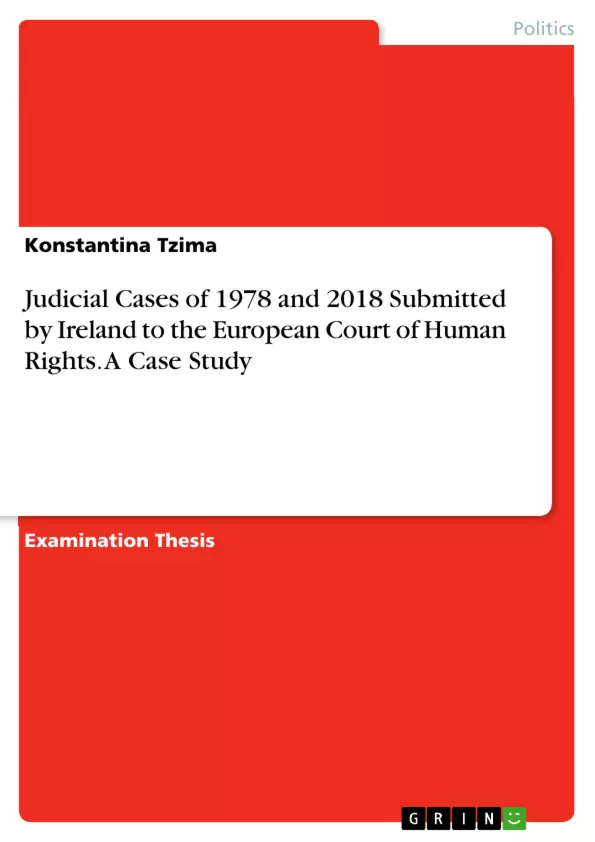A thorough analysis of the judicial cases of 1978 and 2018 submitted by Ireland to the European Court of Human Rights is being presented. The conflict between the Irish Republican Army and the Royal Ulster Constabulary of the UK caused major social unrest. Gradually Ireland sought independance and the only means to obtain it legally was submitting the case to the Court. To be more specific, the present analysis concerns the effort from the Irish side to make the ECHR classify the acts of violence done to the IRA members from the UK forces as torture. It is a clear breach of the Article 3 of the Convention, however the UK side was well prepared and the judicial struggle was about to continue till 2018. The arguments of both the Applicant and the Defendant State are exposed, as well as the Court's verdict. This case, being a milestone for the Convention itself, is worth studying. For the first time the Court was called to define the term "torture" and adopted the "minimum level of severity" to classify an act as such. Would the Court's decision be different today ? The only sure thing is that the lessons learned from this case should not be forgotten, as they pave the way for better decision-making inside the European Court of Human Rights for the future cases to come.
Inhaltsverzeichnis (Table of Contents)
- Introduction
- Part 1º: The 1978 decision
- Subsection 1: Historical background - the path to judicial resolution
- Subsection 2: General information on the case
- Subsection 3: Ireland's position
- Subsection 4: The position of the United Kingdom
- Subsection 5: The interpretation of the articles of the ECHR
- Subsection 6: The judgment of the Court
- Subsection 7: The additional submissions of the Judges
- Part 2º: The 2018 Decision - The request to reconsider the case
- Subsection 1: The placement of Ireland
- Subsection 2: The UK placement
- Subsection 3: The judgment
- Subsection 4: The dissenting opinion of Judge Siofra O'Leary
- Part 3°: The contribution of the case today
- Conclusions
- Bibliography
Zielsetzung und Themenschwerpunkte (Objectives and Key Themes)
This case study examines the European Court of Human Rights (ECtHR) decision in Ireland v. United Kingdom from 1978 and its subsequent reconsideration in 2018. The analysis aims to present the case in its entirety, highlighting the court's perspectives and the controversial issues raised. The study investigates the justification behind the reasoning behind the decisions, which may conflict with the views of judges in the 21st century. It will provide a critical analysis of the case and its historical significance.
- The definition of torture within the context of the European Convention on Human Rights
- The treatment of detainees by security forces in the context of the Northern Ireland conflict
- The evolution of international justice and human rights jurisprudence over time
- The role of the ECtHR in adjudicating interstate disputes
- The significance of the Ireland v. United Kingdom case as a landmark decision.
Zusammenfassung der Kapitel (Chapter Summaries)
The introduction of the case study provides an overview of the importance of the ECtHR in the international system and introduces the historical background of the conflict in Northern Ireland. The study focuses on the controversial issues raised in the Ireland v. United Kingdom case, particularly the definition of torture and its application to the “5 techniques” used by UK security forces on detained suspects.
Part 1 of the study examines the 1978 ECtHR decision, detailing the historical background of the conflict in Northern Ireland, the general information on the case, and the positions of Ireland and the UK.
Part 2 of the study focuses on the 2018 decision, which involved a request to reconsider the 1978 judgment. The study analyzes the UK and Ireland's positions, the court's judgment, and the dissenting opinion of Judge Siofra O'Leary.
Schlüsselwörter (Keywords)
The primary keywords of this study include: European Court of Human Rights (ECtHR), Ireland v. United Kingdom, torture, cruel, inhuman, degrading treatment, Northern Ireland conflict, security forces, detainees, international justice, human rights jurisprudence, landmark decision, 5 techniques, Irish Republican Army (IRA).
- Quote paper
- Konstantina Tzima (Author), 2022, Judicial Cases of 1978 and 2018 Submitted by Ireland to the European Court of Human Rights. A Case Study, Munich, GRIN Verlag, https://www.hausarbeiten.de/document/1438951


